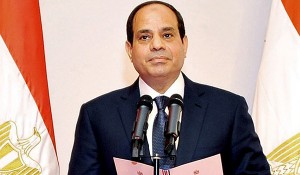Al Sisi increases gasoline prices upto 80% in Egypt
Tuesday, July 8th, 2014 9:30:55 by Khalil Khan
The new Egyptian President Abdelfatá al Sisi, in a risky move that has attracted widespread unrest among the citizenry, has raised the price of petrol grades between 40% and 78 % in order to save the public purse billions of pounds in subsidies. Quarterback Al Sisi took office in early June, almost a year after running a coup against President Mohamed Morsi, the first democratically elected in Egypt, in a context of severe political, economic and fiscal crisis.
The price increase was applied from midnight on Friday, and with only hours of advance notice. With this decision, the Egyptian government aims to reduce the heavy toll of state fuel subsidies, which consume up to 20% of the public budget of 15,000 million per year to just over 10,000. For decades, the State has offered generous subsidies for gasoline, keeping the price well below world market prices. For example, a liter of petrol consumed the most cost less than 20 cents and will now almost 28 cents. The measure is part of a plan of cuts to reduce the budget deficit from 13% to 10% of GDP.
“For many years there is a consensus among experts about the need to cut costly energy subsidies that are clearly regressive. However, until now, no president dared his unpopularity, “explains Mohamed Fahmy Mensa, professor at the American University in Cairo. In a press conference, Prime Minister Ibrahim Mahlab, justified the measure ensuring that the country is in a “war economy” and said that some of the funds are earmarked for social spending.
In the more than three turbulent years that followed the Egyptian revolution, none of the successive governments of the country has changed the pillars of the inherited economic structure of the regime of Hosni Mubarak. Corruption and inequality in a country where 40% of the population lives on less than 1.5 euros a day was the spark that ignited the revolution in 2011.
The sudden decision has been welcomed by the Egyptians with a mixture of irritation and resignation. “State subsidies should be targeted to the poor, but so far, those who have benefited most are these, the most abused,” says Hussein, a veteran driver, pointing to a double-parked luxury SUV. To mitigate the effect of increases in the group of taxi drivers, the governor of Cairo decreed an increase in official fees for their services.
While the poorest parts of the population do not have their own vehicles, as it will affect them directly, as they will affect the prices of services, minibuses a dozen places that used to scroll. In fact, yesterday as tensions and fights between users and owners of microbuses were recorded in various provinces.
In addition, experts fear that the measure causing an inflationary spiral, increasing production costs of enterprises and farmers. The price increase was 12.4 % in 2012, the latest data available from the World Bank. If so, the discomfort could lead to street protests and riots, a scenario perhaps put off by the very stupor of Ramadan, the month of obligatory fasting for Muslims during the day.
“The current Egypt energy equation is unsustainable,” said Ahmed Qandil, energy expert at the think tank Al Ahram referring to the constant power cuts and fuel shortages in the country suffering from gas stations. “A change in consumer habits is necessary and look for new energy sources,” he adds. The next year’s budget also includes an increase in electricity tariff, although in this case the percentage of the increase varies according to consumption.
Tags: Egypt, Egyptian President, gas pricesShort URL: https://www.newspakistan.pk/?p=46084

















